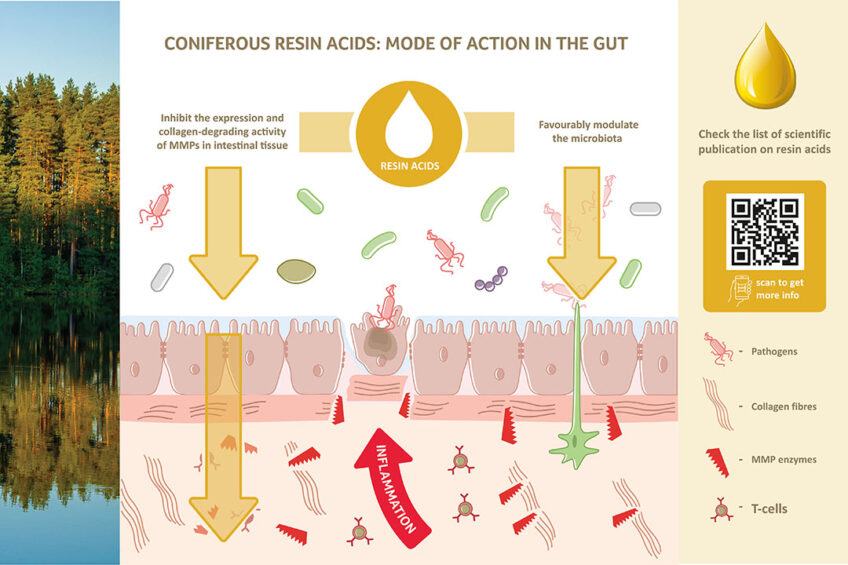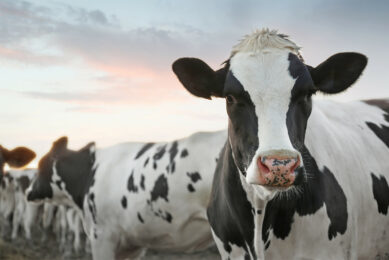Resin acids support intestinal homeostasis

Farm animal performance depends on gastrointestinal functions. Coniferous resin acids support intestinal homeostasis by inhibiting inflammation-associated loss of epithelial integrity and by favouring the growth of beneficial microbes.
Gastrointestinal homeostasis is a prerequisite for the optimal performance of farm animals. The multi-tasking gut needs to digest the feed, absorb the nutrients, host a balanced microbiota and maintain the epithelial barrier and immune functions. A balanced gut feeds the tissues with energy and nutrients but excludes the invasion and growth of pathogens, thus enabling the good performance of animals.
Intestinal ecosystem is constantly challenged in commercial animal production. Pathogenic microorganisms, fungal toxins, anti-nutritional factors, overcrowding and other stressors disturb the balance and demand energy-consuming epithelial responses such as inflammation. Disturbances in gut milieu lead eventually to reduced profitability of animal farming. The industry calls for tools – natural substances – to support intestinal homeostasis.

Dual-purpose resin acids
The standardised composition of coniferous resin acids and tall oil fatty acids (Progres, Hankkija Oy) was developed to meet this demand. Its resin acids are natural diterpene carboxylic acids produced by spruce and pine trees. Resin acids are harvested by thermal distillation from crude tall oil, a sustainable side product of cellulose industry. For centuries, people of the Nordic countries have utilised the anti-inflammatory properties of tree rosin in wound care. Now the same molecules give their benefits to farm animals.
Resin acids have a dual function in the intestinal tract of farm animals. They protect the epithelial barrier and support the growth of beneficial microbiota. The effects have been demonstrated in a ten-year research programme both in vitro and in vivo in chickens, pigs, calves and dairy cows.
Anti-inflammatory action
The effect of resin acids on small-intestinal epithelium of broiler chicken was discovered by the research group of professors Filip Van Immerseel and Richard Ducatelle from the University of Ghent. Diet-derived resin acids reduced the collagen degrading activity of matrix metalloproteinases (MMPs) in the small-intestinal tissue and reduced the infiltration of the inflammatory T-cells in duodenum.
During inflammation, MMPs degrade collagen and other proteins of the extracellular matrix. This leads to “leaky gut”: decreased barrier functions and loss of epithelial integrity. Diet-derived resin acids downregulate the activity and expression of a specific inflammation-associated MMP: matrilysin or MMP7. By suppressing MMP7, in-feed resin acids support epithelial integrity and barrier functions. The reduced infiltration of inflammatory T-cells in duodenum is another proof of the anti-inflammatory action of resin acids.
Benefits to microbiota
Dietary resin acids beneficially modulate the gastrointestinal microbiota of chickens and sows. Test tube experiments have verified the action of the product against gram-positive pathogens such as C. perfringens and Staphylococcus aureus, and also the tolerance of lactobacilli to resin acids.
In broiler chickens, Progres favoured the small-intestinal growth of lactobacilli and the caecal populations of butyrate producers. In sows, opportunistic pathogens like Barnesiella and Campylobacter were reduced while beneficial butyrate producers increased in faecal samples. In these trials, dietary resin acids improved the weight gain and feed conversion of broilers and the reproductive performance of sows.
Resin acids are absorbed by the intestinal epithelium of broiler chicken, but re-introduced to the intestinal lumen via bile, and mostly voided via faeces. Resin acids do not accumulate in breast meat, liver or adipose tissue of broiler chicken. In a dairy cow trial at Natural Resources Institute Finland, resin acids were detected in faeces but not in milk.
Animal performance
Progres improves the growth and feed conversion of broilers, turkeys, calves and goat kids, and the litter size and performance of sows. In dairy cows it enhances the digestibility of the diet and the onset of lactation after calving. The efficacy has been remarkably consistent regardless of the animal species, with a return on investment varying from 3:1 to 15:1. Responses to resin acids have been stronger in challenge studies e.g. coccidiosis or dysbiosis than in non-challenged settings.
In conclusion, diet-derived coniferous resin acids have a dual benefit in the gut: they favourably modulate the microbiota and protect epithelial integrity. Thus, resin acids protect intestinal barrier functions and support homeostasis which are essential functions for high-performing farm animals.
References are available on request
Author:
Hannele Kettunen and Juhani Vuorenmaa, Hankkija Oy
Join 13,000+ subscribers
Subscribe to our newsletter to stay updated about all the need-to-know content in the dairy sector, two times a week.






